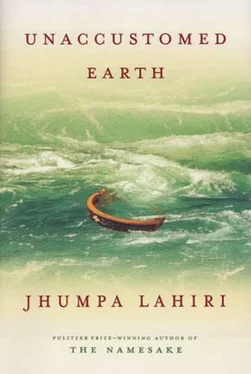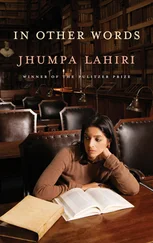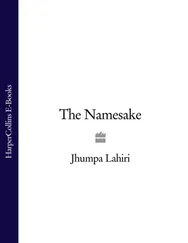My father went one evening to the airport to greet you. It was a school night for me. The dining table had been set since the afternoon. This was my mother's way when she gave parties, though she had never prepared such an elaborate meal in the middle of the week. An hour before you were expected, she turned on the oven. She had heated up a panful of oil and begun to fry thick slices of eggplant to serve with the dal, filling the room with a haze of smoke, when my father called to say that though your plane had landed, one of your suitcases had not arrived. I was hungry by then, but it felt wrong to ask my mother to open the oven door and pull out all the dishes for my sake. My mother turned off the oil and I sat with her on the sofa watching a movie on television, something about the Second World War, in which a group of tired men were walking across a dark field. Cinema of a certain period was the one thing my mother loved wholeheartedly about the West. She herself never wore a skirt-she considered it indecent-but she could recall, scene by scene, Audrey Hepburn's outfits in any given movie.
I fell asleep at her side, and the next thing I knew I was sprawled on the sofa alone, the television turned off, voices filling another part of the house. I stood up, my face hot, my limbs cramped and heavy. You were all in the dining room, eating. Pans of food lined the table, and in addition to the water pitcher there was a bottle of Johnnie Walker that only your parents were drinking, planted between their plates. There was your mother, her slippery dark hair cut to her shoulders, wearing slacks and a tunic, a silk scarf knotted at her neck, looking only vaguely like the woman I'd seen in the pictures. With her bright lipstick and frosted eyelids, she looked less exhausted than my mother did. She had remained thin, her collarbones glamorously protruding, unburdened by the weight of middle age that now padded my mother's features. Your father looked more or less the same, still handsome, still wearing a jacket and tie, a different style of glasses his concession to the new decade. You were pale like your father, long bangs combed over to one side of your face, your eyes distracted yet missing nothing. I had not expected you to be handsome. I had not expected to find you appealing in the least.
"My goodness, Hema, already a lady. You don't remember us, do you?" your mother said. She spoke to me in English, in a pleasant, unhurried way, with a voice that sounded amused. "Come, poor thing, we've kept you waiting. Your mother told us you went hungry because of us."
I sat down, embarrassed that you had seen me asleep on the sofa. Though you had all just flown halfway across the world, it was I who felt weary, despite my nap. My mother served me a plate of food, but her attention was on you and the fact that you were refusing seconds.
"We had dinner before we landed," you replied, a faint accent present in your English, but not the strong accent our parents shared. Your voice had deepened, no longer a child's.
"It's remarkable, the amount of food you get in first class," your mother said. "Champagne, chocolates, even caviar. But I saved room. I remembered your cooking, Shibani," she added.
"First class!" my mother exclaimed, with an intake of breath. "How did you end up there?"
"It was my fortieth birthday gift," your mother explained. She looked over at your father, smiling. "Once in a lifetime, right?"
"Who knows?" he said, clearly proud of the extravagance. "It could become a terrible habit."
Our parents spoke of the old Cambridge crowd, mine telling yours about people's moves and accomplishments, the bachelors who had married, the children who had been born. They spoke about Reagan winning the election, all the ways that Carter had failed. Your parents spoke of Rome, where you'd had a two-day layover to tour the city. Your mother described the fountains, and the ceiling of the Sistine Chapel you had stood three hours in line to see. "So many lovely churches," she said. "Each is like a museum. It made me want to be a Catholic, only to be able to pray in them."
"Do not die before seeing the Pantheon," your father said, and my parents nodded, not knowing what the Pantheon was. I knew-I was, in fact, in the middle of learning about ancient Rome in my Latin class, writing a long report about its art and architecture, all of it based on encyclopedia entries and other books in the school library. Your parents spoke of Bombay and the home you had left behind, a flat on the tenth floor, with a balcony overlooking palm trees and the Arabian Sea. "A pity you didn't visit us there," your mother said. Later, in the privacy of their bedroom, my mother pointed out to my father that we had never been invited.
After dinner I was told to show you the house and where you would sleep. Normally I loved to do this for guests, taking a proprietary pleasure in explaining that this was the broom closet, that the downstairs half-bath. But now I lingered over nothing, for I sensed your boredom. I was also nervous at being sent off with you, disturbed by the immediate schoolgirl attraction I felt. I was used to admiring boys by then, boys in my class who were and would remain unaware of my existence. But never someone as old as you, never someone belonging to the world of my parents. It was you who led me, climbing quickly up the stairs, opening doors, poking your head into rooms, unimpressed by it all.
"This is my room. Your room," I said, correcting myself.
After dreading it all this time, now I was secretly thrilled that you would be sleeping here. You would absorb my presence, I thought. Without my having to do a thing, you would come to know me and like me. You walked across the room to the window, opened it, and leaned out into the darkness, letting cold air into the room.
"Ever go out on the roof?" you asked. You did not wait for me to answer, and the next thing I knew you'd lifted the screen and were gone. I rushed over to the window, and when I leaned outside I couldn't see you. I imagined you slipping on the shingles, falling into the shrubbery, my being blamed for the accident, for standing by stupidly as you did such a brazen thing. "Are you okay?" I called out. The logical thing would have been to say your name, but I felt inhibited and did not. Eventually you came back around, seating yourself on the incline over the garage, gazing down at the lawn.
"What's behind the house?"
"Woods. But you can't go there."
"Who said?"
"Everyone. My parents and all the teachers in school." "Why not?"
"A boy got lost in them last year. He's still missing." His name was Kevin McGrath, and he'd been two grades behind me. For a week we'd heard nothing but helicopters, dogs barking, searching for some sign of him.
You did not react to this information. Instead, you asked, "Why do people have yellow ribbons tied to their mailboxes?"
"They're for the hostages in Iran."
"I bet most Americans had never even heard of Iran before this," you said, causing me to feel responsible both for my neighbors' patriotism and for their ignorance.
"What's that thing to the right?"
"A swing set."
The word must have amused you. You faced me and smiled, though not kindly, as if I'd invented the term.
"I missed the cold," you said. "This cold." The remark reminded me that none of this was new to you. "And the snow. When will it snow again?"
"I don't know. There wasn't much snow for Christmas this year."
You climbed back into the room, disappointed, I feared, by my lack of information. You glanced at yourself in my white-framed mirror, your head nearly cut off at the top. "Where's the bathroom?" you asked, already halfway out the door.
That night, lying on the cot in my parents' room, wide awake though it was well past midnight, I heard my mother and father talking in the dark. I worried that perhaps you would hear them, too. The bed where you slept was just on the other side of the wall, and if I had been able to stick my hand through it, I could have touched you. My parents were at once critical of and intimidated by yours, perplexed by the ways in which they had changed. Bombay had made them more American than Cambridge had, my mother said, something she hadn't anticipated and didn't understand. There were remarks concerning your mother's short hair, her slacks, the Johnnie Walker she and your father continued to drink after the meal was finished, taking it with them from the dining room to the living room. It was mainly my mother who talked, my father listening and murmuring now and then in tired consent. My parents, who had never set foot in a liquor store, wondered whether they should buy another bottle-at the rate your parents were going, that bottle would be drained by tomorrow, my mother said. She remarked that your mother had become "stylish," a pejorative term in her vocabulary, implying a self-indulgence that she shunned. "Twelve people could have flown for the price of one first-class ticket," she said. My mother's birthdays came and went without acknowledgment by my father. I was the one who made a card and had him sign it with me on the first of every June. Suddenly my mother sat up, sniffing the air. "I smell smoke," she said. My father asked if she had remembered to turn off the oven. My mother said she was certain she had, but she asked him to get up and check.
Читать дальше












